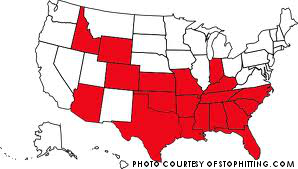

Corporal punishment is defined simply as a physical punishment that involves causing pain in order to deter bad behavior. Physical punishment is not explicitly prohibited in North Carolina and 18 other states. However, parents typically either have to “opt in” or “opt out,” allowing or not allowing their children to be punished.
Force can be used at LRHS in certain circumstances, but corporal punishment is forbidden. Some believe corporal punishment should be more common, however, for every person who supports it, there’s someone who opposes it.
Proponents of corporal punishment believe that paddling children teaches discipline and respect. Critics, on the other hand, call it child abuse.
If corporal punishment existed at Leesville, fewer students would misbehave because they would come to associate their poor behavior with pain.
At high schools, kids are larger and more likely to believe that inflicting this pain upon others is acceptable, as it was done unto them. This can lead to increased bullying, a real problem for high schools, as 77 percent of students are bullied in one way or another.
Students may also fight back against the teacher who is punishing them, causing increased violence at our school. Right now, teachers and administrators can only use appropriate force in certain situations, such as self-defense and to prevent the destruction of property. With corporal punishment, however, certain teachers and administrators would be able to use force when the student did something bad.
Besides calling it child abuse, critics believe that humiliating children through punishment actually does more harm than good, as these students are less likely to trust and have strong relationships with adults in the future. Punishments such as ASD, ISS and lunch detention, while humiliating, don’t have nearly the same effect as being bent over a chair and spanked in front of your whole class.
Leesville, however, is slightly different from any other high school. The social makeup of Leesville differs strongly from other schools around the nation, but is fairly typical of the Triangle, an area defined by its high percentage of Ph.Ds and middle class families.
Middle class families are less likely to physically punish their children immediately and more likely to try and find out the reason behind the behavior. Therefore, many students at LRHS are more used to not being immediately punished, so they may respond differently when disciplined.
LRHS also possesses a variety of cultures with widely diverse ideas toward punishment. For all 2000+ students, it would be difficult, if not impossible, to find a consensus among parents.
While corporal punishment at LRHS could happen some day, the fact that it may cause more bullying and prevent healthy relationships will keep it out of our school.